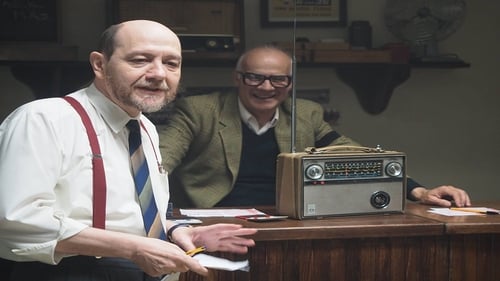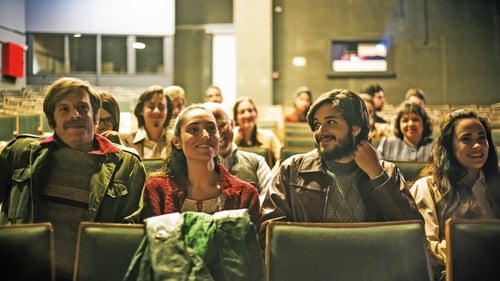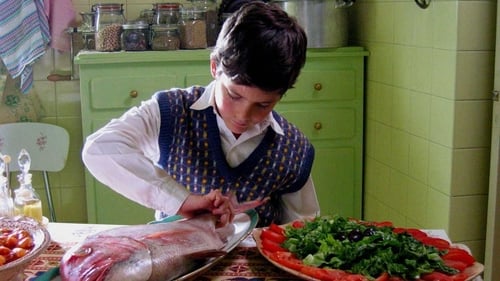
Writer
A.E.K., the well-known Greek basketball team founded in 1924 by refugees from Constantinople, after 44 years, beats SLAVIA of Prague and wins the European Cup.

Director
A.E.K., the well-known Greek basketball team founded in 1924 by refugees from Constantinople, after 44 years, beats SLAVIA of Prague and wins the European Cup.

Writer
It is a movie following the coming-of-age for a boy; the story begins in the mid-60s, continues all through the 70s, and finishes in 1981. He is a creative young man facing the troubles of the first pangs of love and we observe the way he tries to handle them within his social surroundings, his family, and environment.

Director
It is a movie following the coming-of-age for a boy; the story begins in the mid-60s, continues all through the 70s, and finishes in 1981. He is a creative young man facing the troubles of the first pangs of love and we observe the way he tries to handle them within his social surroundings, his family, and environment.

Screenplay
Фанис родился в обычной греческой семье, однако провёл всё своё детство в Турции под присмотром деда, который был не только превосходным кулинаром, но и философом. Дед жил по принципу «в жизни как и в еде, всегда найдётся место пряностям». Человек должен уметь добавлять в жизнь значимые события, чтобы придать ей определённый «аромат». Фанис рос и под его руководством стал первоклассным поваром. Судьба разделила их, и свои зрелые годы Фанис провёл в Афинах, стараясь по наказу дедушки быть не только отличным кулинаром, но и по возможности «подсластить» жизнь окружающим его людям. После многих лет Фанис возвращается в Стамбул, к старому деду и женщине, когда-то бывшей его первой любовью, и лишь тогда понимает, что забыл оставить хотя бы щепотку ароматного перца для себя самого.

Director
Фанис родился в обычной греческой семье, однако провёл всё своё детство в Турции под присмотром деда, который был не только превосходным кулинаром, но и философом. Дед жил по принципу «в жизни как и в еде, всегда найдётся место пряностям». Человек должен уметь добавлять в жизнь значимые события, чтобы придать ей определённый «аромат». Фанис рос и под его руководством стал первоклассным поваром. Судьба разделила их, и свои зрелые годы Фанис провёл в Афинах, стараясь по наказу дедушки быть не только отличным кулинаром, но и по возможности «подсластить» жизнь окружающим его людям. После многих лет Фанис возвращается в Стамбул, к старому деду и женщине, когда-то бывшей его первой любовью, и лишь тогда понимает, что забыл оставить хотя бы щепотку ароматного перца для себя самого.

Writer
In a dystopian society after an unexpected epidemic citizens can't have dreams. Only few people are privillaged to dream. They operate small underground companies where they can have other people dreams.

Director
In a dystopian society after an unexpected epidemic citizens can't have dreams. Only few people are privillaged to dream. They operate small underground companies where they can have other people dreams.

Writer
A computer project based on John Whitneys digital harmony theory. A UCLA project in 1982.

Director
A computer project based on John Whitneys digital harmony theory. A UCLA project in 1982.

Assistant Editor
A typical experimental film, in which a variety of audiovisual techniques are used to create the sense of polymorphic eroticism as developed by European and Mediterranean cinematography of the 20th century. Combining the methods of “animation” and “live action”, this intricate work embodies the idea of an “ars combinatoria”. The structure is loose, with neither a central axis nor a point where everything converges, contributing greatly to the open-ended character of the film, where rhythm is the key element.

Assistant Director
An experimental film using a mixture of techniques to portray the different views of the human body. It consists of seven parts, each one presenting an ideotype of the human body, from the beginning of civilization up to the present time. The body as a concept or dogma is simply the embodied reflection of every civilization, upon which man himself is established. The anthropomorphism that characterizes the sum total of perception, in a clear or latent state, comes from the fact that the human body, as reality, idea and expression, comprises the ultimate reference.









